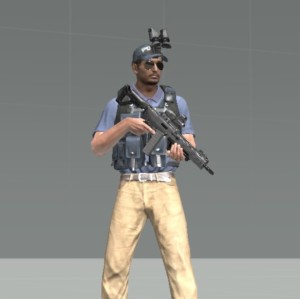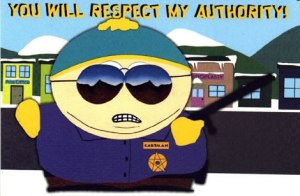
This summer, I started playing the game Arma 3, the military combat simulator for PC. One of the most popular game modes in Arma 3 is the Cops and Robbers mode called Altis Life. My experience seems more relevant now given the global attention around Michael Brown, who was killed by police in Ferguson, Missouri on August 9.
My experience in Altis Life is in no way a substitute for real life duties as a law enforcement officer. I don’t have any real-life experience as a law enforcement officer and have only ever interacted with police in traffic stops and as a witness to a shoplifting incident earlier this year. However, role playing as an officer gave me insight into organizational culture in a police force and interpersonal communication between citizens and authority.
I joined an Altis Life server as a cadet, filled out an officer application through the server’s website, and solicited for references to my conduct by other officers on the server.
My avatar was equipped with a bright yellow cadet uniform with khaki pants, a padded belt with nylon webbing for attachments and a leg holster, and a silenced CZ P-07 pistol substituting for a ranged tazer in the game. As part of my duties, I had the power to serve tickets, restrain individuals, resuscitate wounded individuals, send restrained individuals to jail for up to 15 minutes, and use lethal force if someone’s life is in danger.
[youtube https://www.youtube.com/watch?v=G6JKqiP3Ii8&w=560&h=315]
During my time as a cadet, I learned the rules and regulations of the police faction’s conduct and use of force, coordinated with officers on high-risk actions, and endeared myself to my fellow officers. Within two weeks, I was promoted an officer in the server’s police faction. Laws in the server were adapted from common American legal norms such as civil rights, traffic flow on the right side, and the American standard between reasonable suspicion and probable cause.
Earlier in the summer, officers could acquire a police-marked version of an MRAP vehicle. All lower-level officers had access sub-machine guns and intermediate caliber select-fire rifles. The administrators later restricted the MRAP vehicles to superior officers and could only be deployed if insurgents were present in the city limits. Our lethal equipment was scaled down over time, in contrast to real-life police who have acquired arsenals of surplus military equipment over the last decade.
Interacting with hostile, boorish, and distrustful civilians in the game highlighted how easily out police could descend into an antagonistic us-against-them culture dividing police from civilians. As an officer in the fictional island of Altis, I empathized with the pensive, on-guard stance in which police have to carry themselves while on duty. If I didn’t know the intentions of a player in front of me, I expected the worst and try to compel others to my will to ensure my safety. It’s extremely difficult to gauge a player’s intention since the avatars can only move their mouths when the player speaks into the microphone. Some players don’t have a microphone and can only type. Latency may affect the time it takes for someone to respond to my demands.
A recent Washington Post op-ed by former police officer Sunil Dutta highlighted the justification for heavy-handed police interactions and the mentality that civilians must respect police authority to ensure their safety. I’ve encountered civilians who would not comply with my orders, and later acted to pacify them by restraints or tazing. When they respond that they’ve done nothing wrong, and continue with insults like “F the Police” and call us pigs, I responded “When an officer gives you an order, you don’t argue! you comply!!!” In trying to impose my will on these civilians with the force vested in me, I channeled this troublesome police mindset that Dutta espouses.

Away from the computer, I’m peaceful and mindful of my rights as a citizen and resident of the United States, and I think Dutta’s perspective is myopic and disturbing. While Dutta gives sound tactical advice (civilians may refuse a search, choose to remain silent, ask for a lawyer, and determine whether they are under arrest or free to go), the op-ed ignores the us-versus-them culture. Distinguishing police from the public, whose peace and safety they have sworn to protect, may psychologically enable police to abuse their powers and harm innocents.
Racism on the server was severely punished, so was less of a problem than in other places. The majority of players in the server are white, and some white players may role play with an avatar that is not white, in an often mocking and stereotypical way that exposes their privilege away from the computer. The fact that real life police often profile and discriminate against communities of color exacerbates the cultural divide between police and citizens, which is why the events in Ferguson struck a nerve around the country, and the world.
I remain an upstanding virtual police officer in the server, and as long as I am, I will continue to play that role and apply the authority vested in me in the game. I hope to remain mindful of the us-vs-them divide and assert myself peacefully and positively in real life.